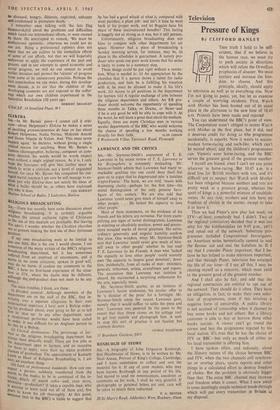LAWRENCE AND THE CRITICS
SIR,—Mr. Seymour-Smith's assessment of T. E. Lawrence in his recent review of T. E. Lawrence to his Biographers is extremely misleading. Mr. Seymour-Smith admits that Lawrence had many re- markable qualities (no one could deny that) but goes on to argue that he degenerated into 'a tasteless crypto-Fascist.' The book, we are told, `traces with depressing clarity—perhaps for the first time—the moral disintegration of the only genuine hero- figure of this century.' We are also told that Lawrence 'could never give much of himself away to other people. . . He lacked the capacity to love other people.' Most of these statements, on the evidence of his friends and his letters, are nonsense. Far from exem- plifying any signs of moral disintegration, Lawrence in rejecting so absolutely position, power and posses- sions revealed marks of moral greatness. His extra- ordinary generosity and singular humility confirm this view. One wonders, when Mr. Seymour-Smith says that Lawrence 'could never give much of him- self away to other people' whether he has read T. E. Lawrence by his Friends. A man who 'lacked the capacity to love other people' could scarcely own 'the capacity to inspire great devotion'; devo- tion, incidentally, from all ranks of men: ministers, generals, tribesmen, artists, aircraftmen and rogues. The accusation that Lawrence was tasteless is absurd. He maintained a surprising enthusiasm for the arts, especially music.
Mr. Seymour-Smith quotes, as an instance of Lawrence's fascist tendencies, his jocular offer to be 'a dictator of the press' for a fortnight. Mr. Seymour-Smith omits the reason Lawrence gave, namely that it would suffice 'to settle the press and him.' Lawrence was pestered by the press to the extent that they threw stones on his cottage roof to get him outside and photograph him. A wish to stop this sort of practice is not fascism but common decency.
GEORGE WIGHTMAN 11 Bramhant Gardens, SW5


































 Previous page
Previous page